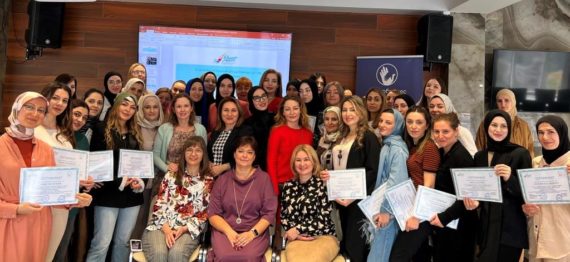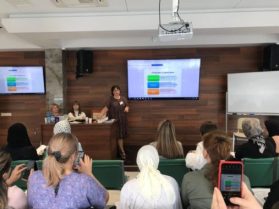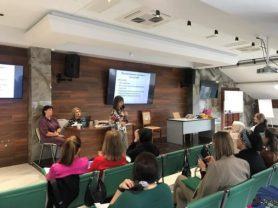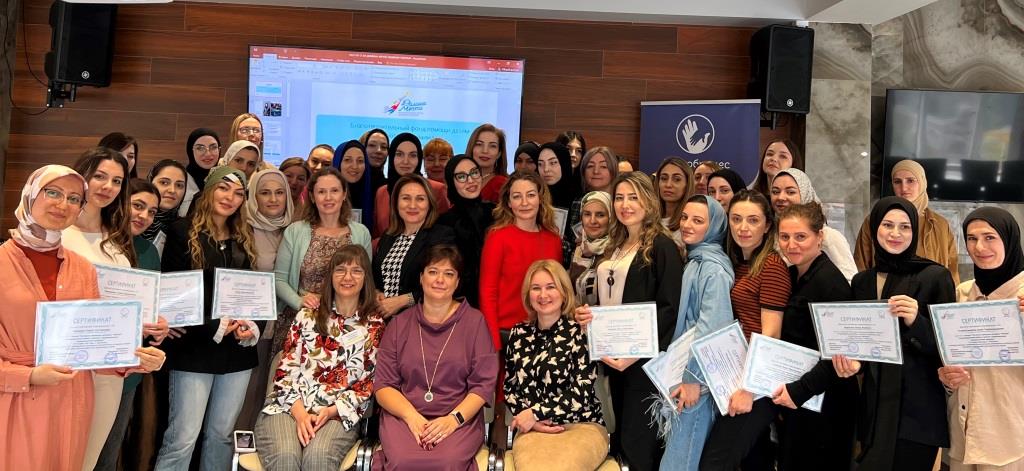 Charitable Foundation “Diema’s Dream” mobilized all the forces and resources to preserve and transfer the technology of working with children with severe and multiple developmental disorders (SMND). Despite the difficult conditions, the foundation transfers experience, knowledge and tools to colleagues working in the field of rehabilitation of children with SMDD.
Charitable Foundation “Diema’s Dream” mobilized all the forces and resources to preserve and transfer the technology of working with children with severe and multiple developmental disorders (SMND). Despite the difficult conditions, the foundation transfers experience, knowledge and tools to colleagues working in the field of rehabilitation of children with SMDD.
For the first time in the Republic of Dagestan, 5 teams of specialists using the “Portage” method will start working at once. One team is formed on the basis of the Orphanage “Care”, four more teams will support families of children with developmental disabilities on the basis of the Center for Ability. Educators, defectologists, speech therapists, educational psychologists, clinical psychologists, ABA therapists, neuropsychologists have been trained at the Seminar “Basic Principles of the Portage Method” and are ready to start working with children and parents.
The Foundation provides support for teams with supervision and regular consulting support for 6 months, so that team specialists who have just completed training at the seminar can work and apply this methodology in practice. The support of a consultant is important. Specialists will gain experience in applying the methodology and experience in teamwork, and after the pilot project stage they will be able to provide effective assistance to a large number of families.
Transferring technology is not easy. It is important to comply with all norms and principles – then a positive result is guaranteed. Portage allows you to achieve results even in the most difficult cases of impaired child development.
Portage is not just a method and toolkit for working with a child to teach him vital skills (baby skills, cognition, speech and communication, movement, self-service and socialization). Portage is also a system of interaction between institution specialists and, most importantly, a method that allows parents play the main role in the process of rehabilitation of the child. In this case, parents are guaranteed to become successful.
For 16 years of work, the foundation turned to different work technologies, developed its own center for social habilitation. However, the experience of British colleagues who transferred technology to Russia impressed the foundation’s specialists and philanthropists so much that priority was given to the development of the Portage system. The uniqueness lies in the fact that a team can be formed from specialists with any level of education, and correctional and developmental classes with a child can be conducted by the parents themselves.


“The lack of qualified specialists, the lack of qualifications of existing workers, the structure of the developmental disorder of the child is too complex, the parents give up, the family cannot cope with the needs of the child and finds itself in a difficult situation, the mother is chained to the child, caring for 24/7, the child does not get what he needs assistance in full and cannot reveal their potential, specialists and parents are slowly but surely moving towards emotional burnout – these are just some of the social problems that arise in the life of children with SMDD.
We want a team of specialists in every region, within walking distance for a family and a child with developmental disabilities, who are ready to accompany the family in effective ways. Developmental delay in most cases can be compensated for with timely assistance. Such assistance should be only individual, and the most important success factor here is the participation of the parent in the process of conducting classes and rehabilitation,” says Elena Volodina, director of the Diema’s Dream Charitable Foundation.
In the current conditions, it became possible to create new teams and develop the Portage system thanks to donations from Autoalliance, AlgorithmTechGroup, ISK_PetroEngineering, M-Logistic, PetroEngineering, SpetsMontazhGroup, SpetsTransGroup. And we wish that every company now has the opportunity to stay afloat in difficult conditions and at the same time support social projects. In this way, society remains stable, and needy parents and children remain socially protected.
